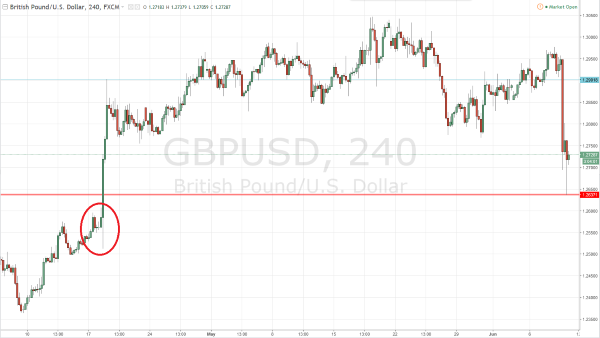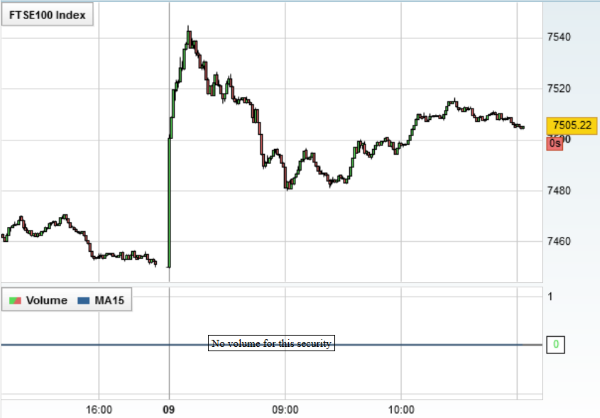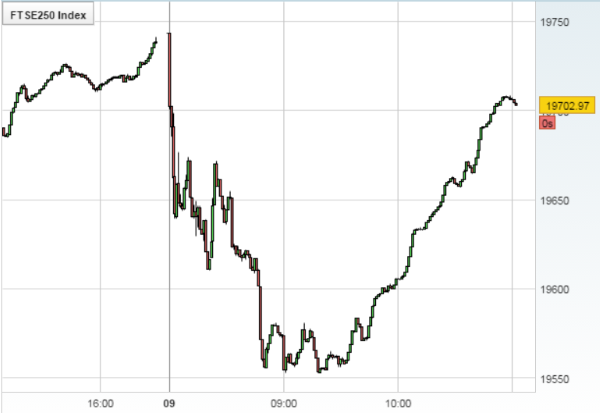UK election: How markets are coping with 'worst outcome'
9th June 2017 11:43
by Lee Wild from interactive investor
Share on
It must be something in the water at Tory HQ. First, David Cameron woefully misjudged the mood of the public which ended in Brexit, and now Theresa May has been caught out in an equally spectacular drubbing at the polls. The result is a hung parliament just days before two years of Brexit negotiations are to begin, guaranteeing a period of great volatility across financial markets.
Interviewed on the BBC last night, Tory grandee Ken Clarke said a hung parliament would be the "worst outcome". He's right.
Currently, with just one result still to come, the Conservatives have 318 seats (down 12) and Labour 261 (up 29, and the first gains in two decades). Of the rest, it may be the Liberals, or Democratic Unionists with 10 seats, that play kingmaker.
When May called the snap general election on 8 June, Labour leader Jeremy Corbyn was a sick puppy. She saw a chance to turn the Conservative's slim majority into a formidable mandate for critical Brexit negotiations, building her campaign around the slogan "strong and stable government".
Despite what they say, it was a sensible plan. But May was the mistress of her own downfall, refusing TV debates and getting caught out on big issues among core voters around the Dementia Tax and NHS.
Corbyn's camp played the 'nice bloke' card superbly, and policies resonated with young voters. The exit poll gave us our first clue that the Tories were in real trouble, and by 1am the writing was on the wall when Darlington kept its Labour MP.
Futures prices had already gyrated wildly after London closed Thursday, and continued do so as the results came in.
FTSE 100 and sterling futures dived shortly after 10pm. The pound collapsed from $1.2950 to near $1.2640 – it's worst levels since May called the election on 18 April - and FTSE futures from 7,450 to near 7,380 as the exit poll came in.

Source: TradingView
But when the market opened Friday, and with no doubt about the result, the FTSE 100 surged as much as 90 points to 7,545, within one good push of a record high.
Predictably, it was sterling's dive to a low of $1.2636 that excited the index loaded with multi-nationals. They get far more pounds for their buck when translating expensive US dollar earnings back into their reporting currency.
Fashion chain , US-focused plumbing supplies giant , cosmetics ingredients exporter and tobacco giant all rallied first thing Friday.
Index heavyweights , , , and miners like , , and , all rose sharply at the opening bell.

For mid-caps more focused on the domestic economy, however, there was plenty of reason to worry.
It's unclear how things will pan out over the next few hours, days and weeks, but neither a fragile coalition or second election either in the autumn, or when Conservative-friendly boundary changes come in early next year, is positive for UK-focused equities.
A position of weakness ahead of Brexit negotiations, due to begin on 19 June, puts further pressure on the pound, raising the cost of imports. That means higher inflation and less disposable income for households.

No wonder retail stocks have taken a dive. High street bellwether and sank around 4%, and , already on the receiving end of Qatar-fuelled selling, fell heavily.
Domestic banks like and are nursing losses, as are housebuilders , , , and .
No one wants to own UK real estate leaders, either, dumping , , and . Fear here is that new projects get put on hold and banks reassess funding of new developments.
However, as you can see from the chart above, sentiment changes quickly in these markets.
While we can make some assumptions about our weakened position in terms of Brexit negotiations, there is still plenty of doubt around possible political outcomes and their economic consequences short-term. But, as deVere Group founder and CEO Nigel Green says, some things are predictable.
"Volatility is the only certainty in these uncertain times," says Green. "But, of course, volatility can also bring considerable opportunities and investors should avoid knee jerk reactions at this time."
This article is for information and discussion purposes only and does not form a recommendation to invest or otherwise. The value of an investment may fall. The investments referred to in this article may not be suitable for all investors, and if in doubt, an investor should seek advice from a qualified investment adviser.